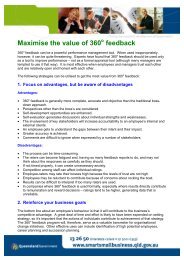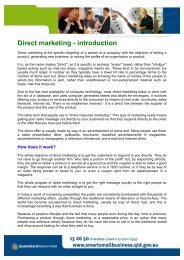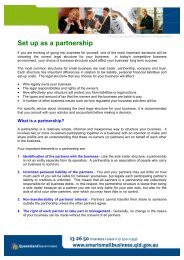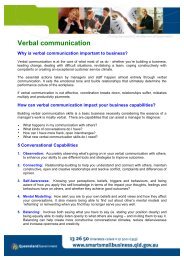Manage An Effective Work Team (PDF â 129kb) - AJML Group
Manage An Effective Work Team (PDF â 129kb) - AJML Group
Manage An Effective Work Team (PDF â 129kb) - AJML Group
You also want an ePaper? Increase the reach of your titles
YUMPU automatically turns print PDFs into web optimized ePapers that Google loves.
You also need to know how to help new or existing workgroups make the transition to teams that<br />
are high-performing, broadly-skilled and self-managing - taking them through the key steps, issues<br />
and choices that are critical to forming and sustaining successful teams that can become more<br />
self-directing over time.<br />
Finally you’ll need to find ways to re-skill your team once it’s formed. When you do, remember to<br />
emphasise team and self-management skills just as much as any new technical, task-specific<br />
ones. To be effective, your team needs a range of new team-based skills in addition to workspecific<br />
skills - for example:<br />
y<br />
y<br />
y<br />
y<br />
y<br />
y<br />
<strong>Team</strong> Communication Skills: Interpersonal and group communication skills to conduct<br />
effective team meetings, discussions and other team interactions.<br />
<strong>Team</strong> Facilitation Skills: Common group facilitation tools and techniques to engage<br />
constructively in team interactions and enhance how teams work together.<br />
<strong>Team</strong>work-Based Design Skills: To apply tools to continuously re-evaluate, redesign and<br />
renew the team’s approach to work.<br />
<strong>Team</strong> <strong>Manage</strong>ment Skills: To tackle new responsibilities for coordinating/managing work<br />
systems/procedures (eg. planning, scheduling, work allocation).<br />
<strong>Team</strong>-Maintenance Skills: To use effective patterns of personal/group behaviour to identify<br />
and correct teamworking problems and maintain good team relationships.<br />
<strong>Team</strong> Formation Skills: To be able to apply principles/concepts for how to form self-directed<br />
teams and work through various stages and steps in team formation.<br />
<strong>Team</strong>-based work is now part of every business leader’s landscape. As well as providing<br />
environments that encourage people to make suggestions, think creatively and innovate,<br />
workteams are a continuous improvement tool. They’re a vehicle for tapping a broader range of<br />
knowledge, expertise, innovation and initiative that can widen your viewpoint about what can be<br />
done differently and better in your business.<br />
Further information<br />
The following fact sheets provide further information on these issues:<br />
• <strong>Effective</strong> work teams<br />
• Help groups make decisions<br />
• Set achievable goals








